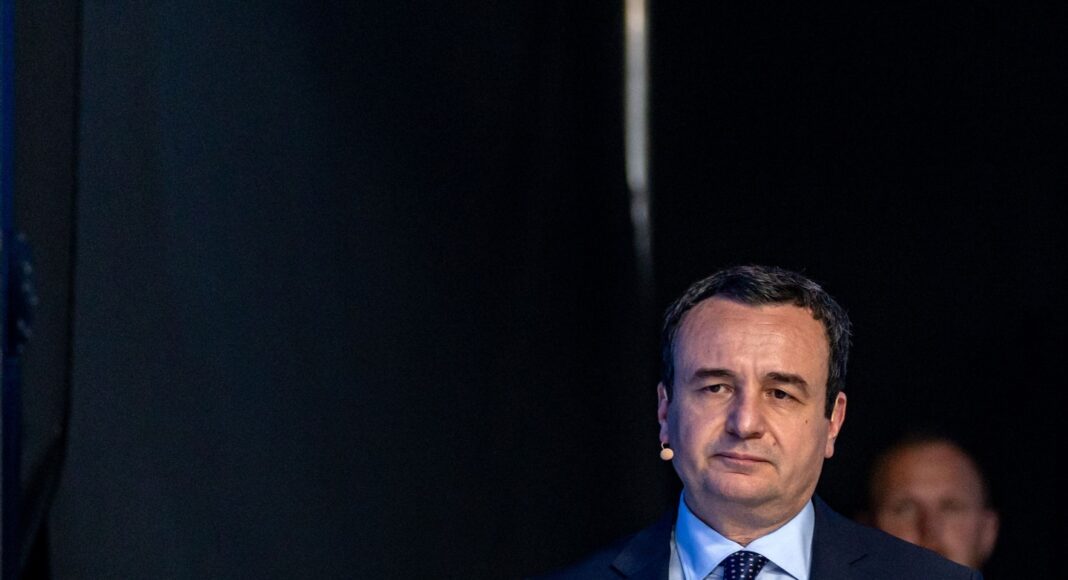Ειδήσεις Ελλάδα
Comment on this storyComment
Kosovo Prime Minister Albin Kurti on Thursday criticized “harmful” statements from Washington and other allies rebuking his government for heightening tensions in majority-Serb areas of the country, but said he is set to meet Serbian President Aleksandar Vucic amid efforts to de-escalate.
The meeting — on a date not yet finalized — was being organized by European Union foreign policy chief Josep Borrell, Kurti said. His comments in a interview with The Washington Post came as Secretary of State Antony Blinken reiterated a call for both Kosovo and Serbia to take action to reduce tensions.
Germany and France also called on Kosovo to hold new elections in majority-Serb areas of the north that have been the focus of the unrest, including clashes that resulted in injuries to more than 30 NATO peacekeepers. The scenes of violence have fueled concerns of a return to more intense conflict in Kosovo, where the 1998-1999 war claimed more than 10,000 lives.
NATO peacekeepers injured in Kosovo: What to know about the clashes
U.S. officials have expressed deep frustration with Pristina over events in recent days. Blinken said last week that Kosovo’s decision to use police to forcibly install ethnic Albanian mayors in four majority-Serb municipalities “sharply and unnecessarily escalated tensions.” As punishment, Washington expelled Kosovo from taking part in planned military exercises, while threatening to end international lobbying for the country’s recognition.
It represents a thorny turn for relations between Washington and Pristina. The United States has been a strong supporter of Kosovo’s independence from Serbia, declared in 2008 — a move Belgrade never recognized. Among other holdouts in recognition are five E.U. countries: Cyprus, Greece, Romania, Slovakia and Spain.
“United States of America is our indispensable ally, friend and partner,” Kurti said. “We are eternally grateful and thankful for their role, for our liberation and independence, for our security and defense, for our development and democracy. But now it is also the time to speak our democratic truth to authoritarians in power.”
Kurti said he understands the West only wants keep the peace: “But when you’re dealing with the far right, with ultranationalists and very dangerous authoritarian regimes, statements that are intended to keep peace just keep emboldening the authoritarian figures.”
Kosovo blames Serbia for fomenting the “violent mob” that demonstrated against the mayors being installed. Officials note that a Serbian police officer was among those arrested.
Kurti said Kosovo had little choice but to install the mayors — despite one coming in with little more than 100 votes after a Serb boycott meant turnout was less than 4 percent. “Who else can go in these offices?” he said.
But the United States saw the move as a provocation. “We’ve been very clear about our concerns about some of the recent actions that were taken,” Blinken said during a trip to Oslo on Thursday. “We’ve said that directly to leaders involved, including Prime Minister Kurti.”
Vucic on Thursday called for the withdrawal of the “alleged mayors” from their positions. Arriving at the European Political Community summit in Moldova, he said removing them would be a “powerful move” toward resolving the crisis.
Vucic met with Kosovo President Vjosa Osmani during the summit, French President Emmanuel Macron said in a news conference Thursday. France and Germany are calling for elections to be repeated in the four municipalities, Macron said, describing their mandate as “obviously not legitimate.”
In his interview ahead of the request from Germany and France, Kurti conceded that these are mayors “with a small m.” He said that he expects there is “no way” they will see out their two-year mandate but he pushed back against their removal, saying he “cannot surrender” to the demands of a “fascist militia.”
For early elections to happen, there also needs to be “rule of law,” he said, adding that a new vote is likely to face a similar boycott.
Germany and France are also calling for a settlement of the issue of increased autonomy for the majority-ethnic Serb areas, which was agreed to by Pristina a decade ago but has not been implemented — one of the reasons for the boycott.
“Each party will now consult on their side and come back with clear answers next week,” Macron said.
Kurti says that the agreement is unconstitutional but that Kosovo is willing to work toward an “appropriate level of self-management” for the Serbian community as outlined in an E.U. proposal for normalization this year.
Kurti has been pushing for an increased NATO peacekeeping presence in the country since the beginning of the war in Ukraine, amid concerns that Moscow would use its strong links to Serbia to stir unrest on a different front in Europe. Following the clashes late last month, NATO dispatched a further 700 troops to Kosovo, which has had a peacekeeping presence for nearly 25 years.
Kurti said he won’t bend to international requests to remove police from the municipal buildings until the protesters are dispersed or arrested.
“If these violent mobs are out in Serbia or in imprisonment, then we could decrease,” he said, suggesting the number of police could be brought down to “single-digit” figures.
Beatriz Ríos in Brussels contributed to this report.



